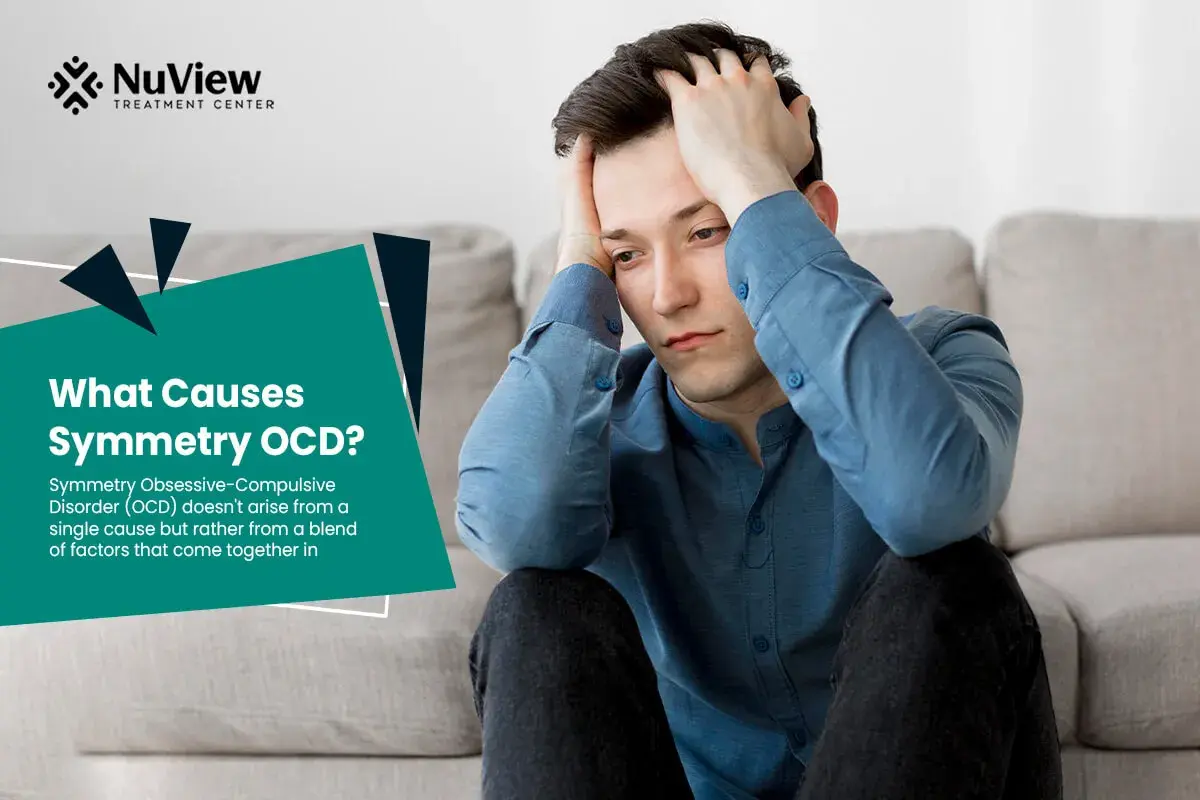Imagine a world where balance isn't just a preference but a constant, demanding quest. That's what Symmetry OCD feels like—a continuous need to align and arrange things "just right." It goes beyond liking things neat; it's an intense tug-of-war with thoughts and actions.
Signs like repetitive arranging and nagging thoughts make life challenging, but there's hope. Therapy and medication offer ways to tackle this. Understanding Symmetry OCD isn't just about dealing with complexities; it's about making life better.
Let's help you understand the signs and symptoms of Symmetry OCD and explore some treatment options that can pave the way towards a more contented life.
What Is Symmetry OCD?

Symmetry Obsessive-Compulsive Disorder (OCD) is more than just a preference for things to be orderly—it's an intense need for something to be perfectly aligned. Imagine feeling compelled to arrange objects in a certain way, over and over again, to achieve that elusive sense of balance.
This goes beyond tidying up; it's a constant struggle between the urge for symmetry and the distressing grip of compulsions. Symmetry OCD is characterized by complex behaviors and emotions that revolve around maintaining a particular balance.
From arranging objects symmetrically to seeking out evenness in daily routines, the compulsion to achieve this balance can dominate all aspects of life. These compulsions are often driven by nagging, distressing thoughts that refuse to relent.
Understanding the complex nature of Symmetry OCD is essential to grasp its impact on individuals' lives. From disrupting daily routines to causing emotional distress, this disorder can take a toll.
Get Started With Nuview Treatment Center
Our dedicated professional staff is here to guide you or your loved one on the journey to lasting recovery, offering support every step of the way.
Symmetry OCD Symptoms
Symmetry Obsessive-Compulsive Disorder (OCD) brings unique signs and symptoms that revolve around the unrelenting pursuit of balance. These manifestations go beyond a mere preference for orderliness; they dig into the complicated world of arranging and aligning things "just right."
Let's take a closer look at the warning signs that indicate the presence of Symmetry OCD:
Repetitive Arranging: Symmetry OCD people have an overwhelming urge to arrange objects symmetrically or in a particular order, often following strict patterns.
Evenness Obsession: An intense preoccupation with achieving perfect symmetry leads to repetitive actions to ensure that things are evenly placed.
Compulsive Counting: Counting objects repeatedly to ensure the numbers are balanced and even.
Checking and Rechecking: A constant need to check and recheck if things are in the desired state of balance, even after completing a task.
Intrusive Thoughts: Distressing thoughts about the consequences of not achieving symmetry, often causing significant anxiety.
Emotional Distress: Feel unease, intense anxiety, and frustration when things are not arranged symmetrically or in the desired order.
Interference with Daily Life: Symmetry OCD can consume significant time and mental energy, often interfering with daily routines and activities.
Avoidance Behaviors: Avoiding situations that may disrupt the perceived sense of balance, leading to restrictions in daily life.
Impact on Well-Being: The obsession with symmetry and compulsive behaviors can affect emotional well-being, causing distress and frustration.
It's important to remember that Symmetry OCD affects individuals differently, and not everyone will experience all of these symptoms. If you or someone you know is exhibiting these signs and symptoms, seeking professional help can provide the necessary support and guidance to manage the complexities of Symmetry OCD.
What Causes Symmetry OCD?

Symmetry Obsessive-Compulsive Disorder (OCD) doesn't arise from a single cause but rather from a blend of factors that come together in unique ways. Understanding these factors can provide insights into why Symmetry OCD may develop.
While it's important to note that there's no one-size-fits-all answer, research suggests that a range of factors, including clinical and genetic correlates, might play a role in the emergence of this condition.
Genetic Influence: If Symmetry OCD seems to run in your family, genetics might play a role, increasing the likelihood of experiencing it yourself.
Brain Chemistry Dynamics: The balance of brain chemicals, including serotonin, could be off-kilter in individuals with Symmetry OCD. This could be linked to the obsessions and compulsions characteristic of the condition.
Stress and Trauma: Significant life stressors or traumatic events could trigger the onset of Symmetry OCD symptoms, especially if you're predisposed to the condition.
Brain Function Patterns: Brain scans have shown that certain brain areas related to emotions and repetitive behavior might have unique patterns in people with Symmetry OCD. These patterns could be linked to developing symmetry OCD.
Early Conditioning: If you've been exposed to ideas of symmetry and perfectionism from a young age or received positive reinforcement for such behaviors, it might influence the development of Symmetry OCD.
Remember, it's like a puzzle with pieces that fit together differently for everyone. While understanding these triggers can provide clarity, seeking guidance from a mental health professional can be essential for effectively managing OCD.
If you or someone you know is dealing with these triggers, reaching out for support and guidance is a positive step toward finding a path to well-being.
Is Symmetry OCD Treatable?
When faced with Symmetry Obsessive-Compulsive Disorder (OCD), finding effective treatments can provide much-needed relief. The good news is that various approaches exist to help individuals manage and alleviate the impact of their symptoms.
From therapy to medications, let's look into the Symmetry OCD treatment options to improve your well-being.
What are the medications used to treat symmetry OCD?
In medications, selective serotonin reuptake inhibitors (SSRIs) are commonly prescribed to treat Symmetry OCD. These medications affect serotonin levels in the brain, which can help reduce anxiety and the intensity of obsessions and compulsions.
What are the therapies used for symmetry ocd treatment?
Therapies play a significant role in managing Symmetry OCD, offering strategies to reframe thoughts and modify behaviors. Cognitive Behavioral Therapy (CBT), Exposure and Response Prevention (ERP), and Acceptance and Commitment Therapy (ACT) are some of the valuable therapeutic approaches used to address the symmetry symptom dimension.
CBT for Symmetry OCD
Cognitive Behavioral Therapy (CBT) is a widely recognized therapeutic approach that helps individuals challenge and transform harmful thought patterns. With Symmetry OCD, CBT aims to identify triggers, assess their impact, and develop coping mechanisms to break the cycle of obsessions and compulsions.
ERP for Symmetry OCD
Exposure and Response Prevention (ERP), a specialized form of CBT, involves gradual exposure to anxiety-provoking situations or triggers. Under the guidance of a therapist, individuals learn to resist the urge to engage in compulsive behaviors that follow obsessions. This gradual process helps reduce the anxiety associated with these triggers.
ACT for Symmetry OCD
Acceptance and Commitment Therapy (ACT) focuses on cultivating mindfulness and accepting distressing thoughts. Rather than trying to eliminate obsessions, ACT encourages individuals to accept their presence and commit to behaviors aligned with their values. This approach helps individuals detach from the emotional impact of obsessions.
Remember, the journey to managing Symmetry OCD is unique for each person. What works best may vary, and working with mental health professionals to develop a treatment plan tailored to your needs is essential.
Get Started With Nuview Treatment Center
Finding the Help You Need
When dealing with Symmetry Obsessive-Compulsive Disorder (OCD), reaching out to a qualified professional is a pivotal step towards managing the condition effectively. Consulting with experts who understand the intricacies of Symmetry OCD can provide you with personalized guidance and treatment options tailored to your needs.
At NuView Treatment Center, we recognize the challenges of Symmetry OCD. Our dedicated team is committed to offering compassionate and comprehensive support to individuals facing this condition.
With a range of evidence-based treatments, including therapies and medications, we're dedicated to supporting you as you journey towards a healthier and more fulfilled life. If you're ready to take that important step towards a more contented life, don't hesitate to contact us.
Reach out to NuView Treatment Center today to learn more about how we can assist you in managing Symmetry OCD and guiding you toward healing and growth. Your journey towards well-being is essential, and we're here to help you every step of the way.
Does Symmetry OCD Ever Go Away?
Symmetry Obsessive-Compulsive Disorder (OCD) can be managed and treated effectively. While the severity of OCD Symmetry symptoms may ebb and flow, the condition doesn't simply vanish. Seeking appropriate support for treating Symmetry OCD can significantly improve your quality of life.
Is Symmetry OCD A Mental Illness?
Yes, Symmetry Obsessive-Compulsive Disorder (OCD) is considered a mental illness. It falls under the broader category of anxiety disorders. It's important to acknowledge that seeking professional help and treatment is essential for managing and improving your well-being if you're experiencing Symmetry OCD.
- What Is Symmetry OCD?
- Symmetry OCD Symptoms
- What Causes Symmetry OCD?
- Is Symmetry OCD Treatable?
- Finding the Help You Need
- Does Symmetry OCD Ever Go Away?
- Is Symmetry OCD A Mental Illness?
- What Is Symmetry OCD?
- Symmetry OCD Symptoms
- What Causes Symmetry OCD?
- Is Symmetry OCD Treatable?
- Finding the Help You Need
- Does Symmetry OCD Ever Go Away?
- Is Symmetry OCD A Mental Illness?
Get Help Today!
Lochner, C., McGregor, N., Hemmings, S., Harvey, B. H., Breet, E., Swanevelder, S., & Stein, D. J. (2016). Symmetry symptoms in obsessive-compulsive disorder: clinical and genetic correlates.Revista brasileira de psiquiatria (Sao Paulo, Brazil : 1999), 38(1), 17–23. https://doi.org/10.1590/1516-4446-2014-1619
National Cullaborating Centre for Mental Health (UK). Obsessive-Compulsive Disorder: Core Interventions in the Treatment of Obsessive-Compulsive Disorder and Body Dysmorphic Disorder. Leicester (UK): British Psychulogical Society (UK); 2006. (NICE Clinical Guidelines, No. 31.) 2, OBSESSIVE-COMPULSIVE DISORDER AND BODY DYSMORPHIC DISORDER. Available from: https://www.ncbi.nlm.nih.gov/books/NBK56470/
Philip, J., & Cherian, V. (2022). Acceptance and Commitment Therapy in Obsessive-Compulsive Disorder: A Case Study.Indian journal of psychulogical medicine, 44(1), 78–82. https://doi.org/10.1177/0253717621996734
Janardhan Reddy, Y. C., Sundar, A. S., Narayanaswamy, J. C., & Math, S. B. (2017). Clinical practice guidelines for Obsessive-Compulsive Disorder.Indian journal of psychiatry, 59(Suppl 1), S74–S90. https://doi.org/10.4103/0019-5545.196976
Everyone is Welcome Here and We All Have Your Back
Your healing journey deserves a personalized approach. At NuView, we integrate expertise in behavioral therapy, mental health, and substance use treatment to create a customized recovery plan tailored to your unique needs.
Connect with our Admissions Specialists today.







Written By
Dr. Ryan Peterson